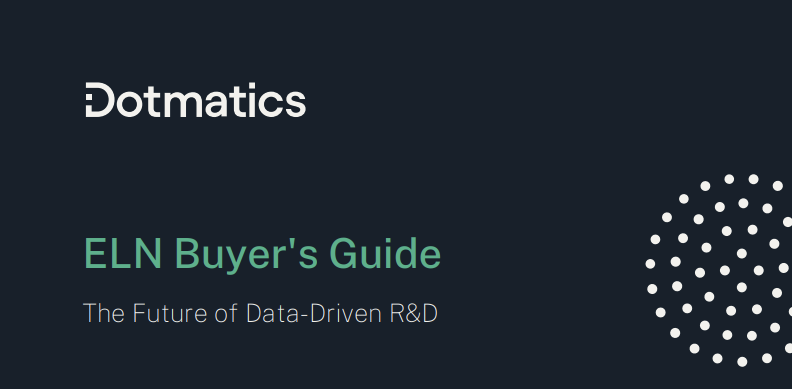Whether you conduct research in biology, chemistry, or chemicals and materials, performing experiments with speed and efficiency is the key to long-term success. In addition to effective data capture, companies and labs need a system that allows them to search, secure, and query the information they collect. You may have heard about the benefits of Electronic Lab Notebooks (ELNs), powerful platforms for gathering, understanding, and sharing your research data.
So how can an ELN transform your science? Alister Campbell, Dotmatics' Vice President, Global Head of Science and Technology, shares insight on how adopting an ELN can help you innovate faster and reach your end goal: turning science data into data science.
Why Switch to an ELN?
Businesses may feel compelled to adopt an ELN because their competitors are using one or because company leadership recommends it. They may also hold misconceptions about ELNs, for example that all ELNs are the same, or that making the switch will be a big hassle. Before adopting an ELN, it's important to understand the value it can provide for your business and end users. These benefits fall into four main categories:
An ELN can quantify the output of your scientific endeavors. How many experiments are your scientists conducting, and how much time do they take?
An ELN improves the quality of your science and data capture. Rather than producing illegible and hard-to-search notes, an ELN keeps your data readable, repeatable, and reusable.
An ELN makes it easier to protect your scientific IP. Your data is your crown jewel. An ELN protects it, and can also facilitate patent and publication writing.
An ELN enhances sharing and collaboration. Make sure your data can be captured, accessed, and annotated by internal and external collaborators around the world.
What an ELN Should Do
A modern ELN is more than just a place to capture experimental data—it's a tool that can become the center of the scientist's world. To find an ELN that provides tangible, measurable outcomes for your company, look for one with the following capabilities:
Powerful search capacity: Your ELN enables you to search across notebooks and scan text within attached files and metadata.
Easy and intuitive to use: Staff and collaborators can learn to use the ELN quickly, without days of training. Collaborators around the world can access the ELN in the language of their choice.
Secure access with fully audited data: Data is available to all of your users—but only to your users.
Integrated registration and inventory: Manage in-house and commercial materials (including small molecules, biologics, and samples) directly from your ELN.
Support for all scientific modalities: Use a single ELN across your organization to maximize simplicity and consistency.
Built-in data access for scientific applications: Integrate software for advanced statistics, visualizations, vector design, chemical drawing, and more.
Open APIs for third-party system integrations: Allow your data scientists to build out additional capacities to meet your company's specific needs.
Instrument data integration: Direct integration with instruments and devices allows scientists to transfer results straight to the ELN.
Out-of-box collaboration capacity: All users can conduct work, ask colleagues to perform tasks, and provide input on tasks done by others.
Accelerate Research With An ELN
End users report that ELNs reduce time spent on tedious tasks, allow them to be more accurate when collecting data, and enable them to move faster from one experiment to the next. Here are some specific ways an ELN can meet your users' needs for time-saving, standardization, collaboration, and data quality.
Save time by cloning existing experiments. When repeating an existing experiment where the process and materials are nearly identical, re-entering information takes time and can lead to inconsistencies. Instead, an ELN offers a cloning capability to copy content between experiments, speeding up the work and improving consistency and accuracy.
Standardize entries with masks for text capture. During an experiment, scientists often report activities through write-ups that can be inconsistent between users and may leave out key information. Instead, an ELN provides pre-written dynamic masks for text, containing all key details from the experiment. A user selects one with a click, saving time and standardizing entries across experiments and users.
Collaborate better with experiment linking. Experiments that are closely related to one another may not be properly linked in traditional lab notebooks. An ELN enables electronic linking of experiments, facilitating the automatic summary or merging of data for comparison, export, visualization, or analysis.
Improve data quality with ontology-guided data entry. In a traditional lab notebook, users capture data in tabular form and can enter free text, with no quality control mechanism. An ELN offers the ability to connect a third-party API service with tailored, controlled vocabularies for guided data entry. Curated ontology services provide context around the terms used, leading to higher-quality data capture for future exploration and mining.
Next Steps
Download the ELN Buyer's Guide to learn what to consider when looking for a modern electronic notebook solution that can accelerate your discovery.




